Basij Thugs Attack Girls Language School In Iran To Enforce Hijab
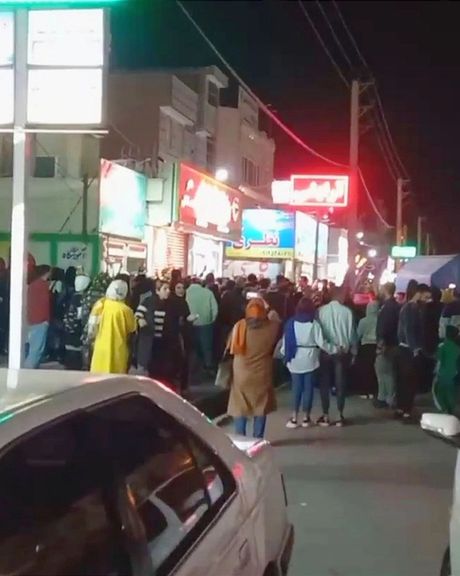
A group of Basij militia forces have attacked a girls' language school in Eslamshahr in the vicinity of Tehran arresting several girls on the pretext of not wearing hijab.

A group of Basij militia forces have attacked a girls' language school in Eslamshahr in the vicinity of Tehran arresting several girls on the pretext of not wearing hijab.
A video sent to Iran International shows Basij plainclothes agents raid Zabangostar school Wednesday night detaining two teenage girls after sealing off the school.
According to witnesses, Basiji forces were filming the classes during the attack.
Reports say citizens, parents and female language learners resisted the attack chanting slogans such as "Death to Basiji".
Violence against women, especially teenage girls, due to what the regime calls "improper hijab" has been going on for over four decades. During the uprising of the Iranian people the violence has intensified with the increase of women's civil disobedience against the mandatory hijab.
The Islamic Republic, however, confronts such civil disobedience with heavy punishment for what it calls "removing hijab".
Despite regime’s efforts to suppress such moves, several famous figures including actresses and female athletes joined the movement against the mandatory hijab and removed their headscarves.
In a statement in January, fifteen prominent Iranian figures, who are usually referred to as “religious intellectuals”, condemned the government policy of compulsory hijab and suppression of women.
Results of surveys conducted by Iranian government agencies are usually not made public, but according to a survey carried out by the ministry of Islamic guidance in 2015, more than 70 percent of Iranians do not agree with compulsory hijab.
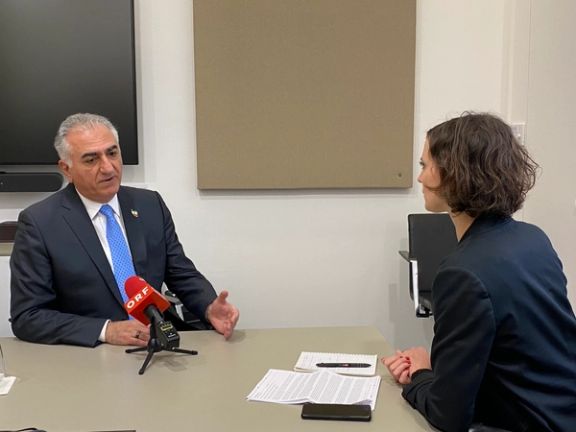
Exiled Prince Reza Pahlavi has once again called on Europe to embrace the “revolution in Iran” while enumerating the benefits of a secular democracy in Tehran.
In thread of tweets extracted from his interview with Austrian national public broadcaster ORF on Thursday, Pahlavi said the strategy of European countries vis-a-vis Iran should be focused on empowering the people while isolating and weakening the Islamic Republic.
Since Europe is geographically near the borders of Iran, it is especially exposed to challenges aggravated by the Islamic Republic, such as security risks and energy demands, he added, noting that the regime is “an unreliable and largely unavailable supply partner in energy,” and “in commerce, an economic market that is neither attractive nor safe as a target for trade or investment.”
He described the policy of engaging with the regime as “betting on a dead horse” and elaborated on how it works against the security interests of Europe. He touched upon some of the issues that the Islamic Republic has been creating for the European countries such as promotion of Islamic extremism and planning and perpetration of assassinations and terror plots on the continent.
He referred to millions of asylum seekers at Europe’s borders, underlining that most of these migrants are coming from the countries that have been hit by unrest due to the destabilizing acts by the Islamic Republic and its proxy militias.
He particularly mentioned the regime’s military support for the Russian invasion of Ukraine that has caused numerous problems for other European countries. Iran’s Islamic government has supplied hundreds of drones to Russia since mid-2022 that have been used during missile attacks to swarm Ukrainian air defenses. Increasingly short of missiles to sustain its brutal bombing campaign of Ukraine’s towns and cities, Russia has turned to Iran and also North Korea to replenish its stocks.
Prince Pahlavi also denounced the Islamic Republic’s diplomatic blackmail via nuclear proliferation, warning the international community against negotiating with Iran as pundits believe that the regime will not be able to harness its growing inflation without lifting US sanctions.
He also talked about the policy of hostage-taking by the regime and using foreign nationals in the country as bargaining chips to get concessions from other countries. His remarks came on the same day that a hardliner newspaper in Tehran, which is funded by the Supreme Leader and its editor often speaks for Ali Khamenei, demanded that German embassy staff be banned from leaving Iran in response to expulsion of two Iranian diplomats from Berlin.
Pahlavi called it political shortsightedness “to engage the Islamic Republic rather than its opposition” especially at a time when the uprising of the people is yielding results and a secular democrat Iran “would solve many of Europe’s prevailing security issues instantly.”
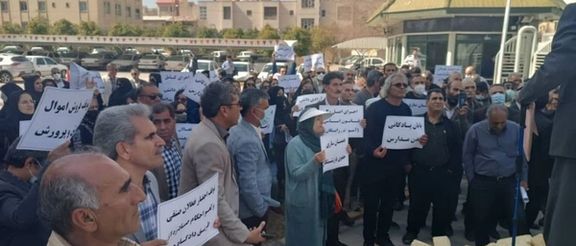
As the "Women, Life, Freedom" protests continue in Iran, various groups continue to protest the poor living conditions and the devaluation of the national currency as inflation topped 50%.
On Wednesday, several cities across Iran including Tehran, Ahvaz and Arak, were scenes of protests reflecting the desperation felt by the failure of the regime to deal with crippling economic conditions. Increasingly, ordinary people and many politicians criticize the government for its inefficiency and lack of a credible plan to deal with the financial crisis.
In the southern city of Ahvaz pensioners gathered in front of the social security building "to protest the poor living conditions and low level of their monthly benefits.”
Retired teachers also held protests in Tehran to support colleagues whose pay is barely enough to live while also voicing opposition to unfair adjustment to pensions. Meanwhile, shop owners went on strike in Arak, resulting in stores across the city closing their doors as prices soared.
These daily protests are compounding the pressure on the regime as they come alongside the nationwide protests against the dictatorship that have swept the country for more than five months.
The Islamic Republic continues to show an iron fist in dealing with the protests that began with the death of Mahsa Amini in the custody of morality police in September, arrested for the inappropriate wearing of her hijab.
Over 500 people have since been killed by the regime forces according to rights groups, with several executed for their participation in protests. Thousands more have been arrested, including children.
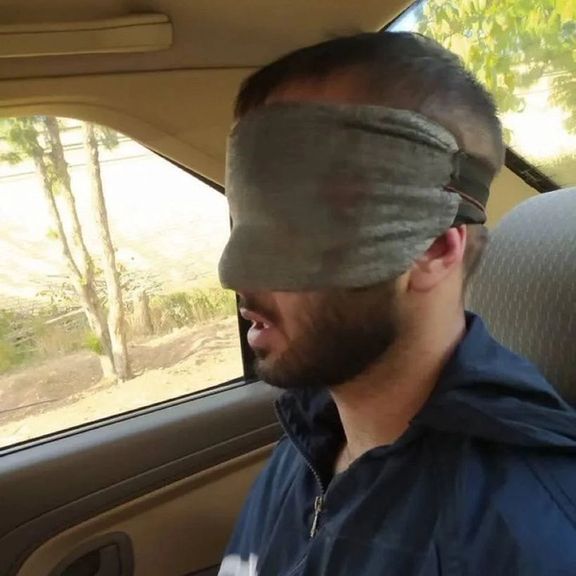
German parliament member Ye-One Rhie has expressed concern over the health condition of Iranian dissident popular rapper Toomaj Salehi who is imprisoned by the regime.
Ye-One Rhie, who is the political sponsor of Toomaj Salehi, wrote in a tweet Wednesday that “Toomaj has been in solitary confinement nonstop for 116 days. His health is worrying. His injuries by torture have never been treated. It's not only his eye but also his hands, his rips and his leg. These could lead to permanent damage.”
She went on to say that the whole world should know who is responsible: Investigator Mohammad Hossein Bakhshi and Prosecutor Mousavian charged Toomaj Salehi with "Corruption on Earth" and "War against God".
In this regard, Toomaj Salehi's twitter account also expressed concern about the deteriorating health condition of the rapper.
Salehi is an artist mostly known for his protest songs about Iran's social issues and injustice by the government. Salehi was arrested on October 30th as part of the crackdown on opponents.
His arrest came shortly after his interview with the Canadian Broadcasting Corporation, saying that “You are dealing with a mafia that is ready to kill the entire nation... in order to keep its power, money and weapons.”
In his politically charged songs such as “Buy a Rat Hole” (2021), Toomaj, a 32-year-old metalworker in Esfahan, spoke out against repression, injustice, poverty, and authorities’ own corruption and impunity from prosecution.
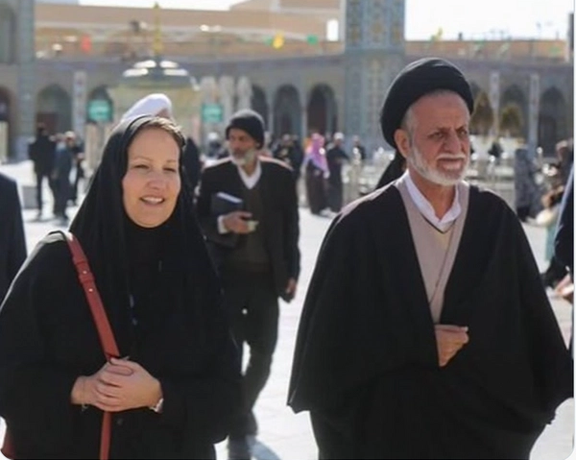
Iranians opposing compulsory hijab are outraged by the Swiss envoy’s decision to wear a long black veil during a shrine visit which a hardliner website has described as “dazzling”.
Photos of Nadine Olivieri Lozano wearing a long black veil that covers the head and the whole body during a visit to Qom were widely published by hardliner media with headlines such as “Swiss Ambassador in Iran Wears Chador” by Hamshahri Online and “Swiss Ambassador’s Visit To Our Lady Masoumeh’s Shrine in Dazzling Hijab” by Arsheh Online.
In the photos, Lozano is seen with several clerics at the shrine and receiving a gift, a religious book, from one of the shrine’s caretakers.
These media outlets said Lozano had traveled to Qom, about 120 km to the south of Tehran, to familiarize herself with Islamic culture and art and the architecture of the shrine. Qom is Iran's second most important religious city, after Mashhad and is home to biggest and most prestigious of Iran's Shiite seminaries.
“Instead of reacting to the atrocities of the regime against women for flouting their hijab or visiting the graves of women and girls who were innocently killed, the Swiss ambassador, who is a woman herself, dons a chador and visits the Shrine of Masoumeh in Qom alongside their killers,” one of the critics, Sarbaz-e Vatan (Soldier of the Motherland), twitted with a photo showing the Swiss ambassador walking with a cleric in the courtyard of the shrine.
Mehdi Hassanpour, another critic, argued in his tweet that the Swiss ambassador’s wearing of the black veil was an insult to both Iranian and Swiss women and demanded her resignation.
Others pointed out that by visiting the shrine and wearing a chador, the Swiss ambassador had provided the “oppressors” of the Iranian women with an opportunity for good publicity at a time when Iranian women were fighting for freedom from compulsory hijab.
Federica Mogherini Former High Representative of the European Union for Foreign Affairs and Security in 2015.
Wearing a chador is required at Shia shrines which often provide them to women who visit. Chadors, however, do not have to be black. The black chador which the Swiss ambassador was wearing during her visit is lauded by the religious establishment as the ‘ultimate hijab’. Visiting female foreign dignitaries are also always required to wear a long headscarf but not a chador during their visit.
Hardliners and clerics of Qom often complain about women in their city not observing the hijab rules “appropriately” and demand its stricter enforcement by the authorities.
According to a commentary by the Revolutionary Guards (IRGC) linked Fars news agency two years ago, the number of women who traditionally wore the black chador was dropping by the day in Qom.
Some of the top clerics in Qom and religious hardliners have repeatedly demanded from the authorities to enforce the hijab rules in their religious city more strictly and to put an end to what they believe are signs of moral depravity among its citizens.
There has been a spate of mysterious poisonings in girls’ schools in Qom since November 30. On Wednesday, three other schools in Qom were attacked and fifteen girls were hospitalized with various symptoms of poisoning.
Some officials have also said that the poisonings could be “deliberate”. In a letter to the prosecutor of Qom Public and Revolutionary Courts Monday, Prosecutor General Mohammad-Jafar Montazeri said “deliberate criminal activity” was suspected in the school poisonings.
Many say on social media that the poisonings that have affected at least 400 girls so far are the work of an extremist group that wants to force girls give up their education by acts of terror.
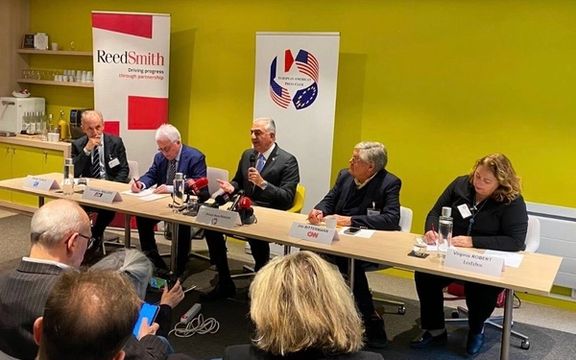
Iranian opposition figures who have recently formed a united front against the Islamic Republic have once again called on other countries to cut ties with the regime.
During a conference in the European American Press Club (EAPC) in Paris on Wednesday, Prince Reza Pahlavi said that if Western countries adopt the policy of “maximum support” for the current protests, the regime will not last long. It would take months as opposed to years, if the international community stands behind the popular protests.
He called for tangible measures to support the Iranians who are out on streets for over five months now such as providing the means for better flow of information and internet access and establishing funds to back the striking workers in the country. Pahlavi suggested that the Islamic Republic’s assets frozen in foreign banks because of sanctions can be used for such purposes.
About his tour of Europe along with fellow dissident figures to garner support for the uprising, he said the voices of the protesters in Iran and the diaspora should be heard by politicians from all across the political spectrum. He referred to his Tuesday meeting with two French senators from different parties, saying the entire political establishments of countries should stand behind the people of Iran.
The question is no longer who will replace the Islamic Republic, but how to overthrow the regime, Pahlavi underlined.
He emphasized that people of Iran do not seek foreign interference and military attack, but want support for their movement against the clerical regime, which can manifest itself in acts of civil disobedience, strikes in different industries and defection among the ranks of the military, especially the lower ranks.
Prince Pahlavi urged the international community not to continue negotiations with the Islamic Republic, saying that instead of seeking the regime’s change of behavior, governments should seek regime change in Iran.
Reiterating the call for designating the Revolutionary Guard as a terrorist organization, he said that it will bring security to the region because its destabilizing activities will decrease. He added that regional countries such as Israel, Saudi Arabia, and even Lebanon, which are affected by the destabilizing role of the IRGC, should ask Western countries to list the outfit as a terrorist organization.
He referred to the resolution overwhelmingly passed by the European Parliament in January, expressing hope that European states would act on it and designate the IRGC.
On Monday, an estimated crowd of about 20 to 30 thousand people held a rally in Brussels outside the European Council to call on EU countries to designate Iran’s Revolutionary Guard as a terrorist organization. Thousands of Iranians from all over Europe held a massive rally in Strasbourg in January for the same purpose. Also on Monday, the EU sanctioned 32 Islamic Republic officials, including culture and education ministers, deputy IRGC commander, and several MPs. The move can be seen as a measure to justify the fact that the EU is not yet ready to designate the entirety of the IRGC.
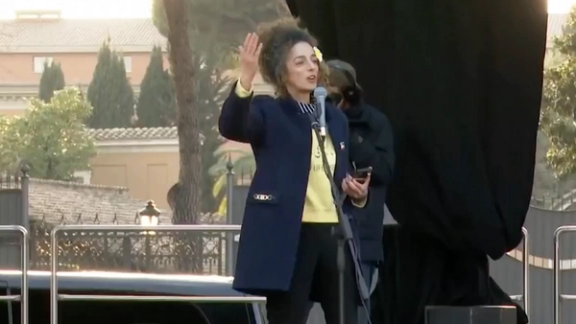
A few hours after Pahlavi’s conference in Paris, two other opposition figures, women’s rights activist Masih Alinejad and Canada-based activist Hamed Esmaeilion addressed a huge rally in the Italian capital Rome. The demonstration in Rome took place a day after the two held a panel about the uprising in Iran at the Italian Senate.
"People of Iran, we are all sentenced to death under the shadow of the Islamic Republic for the crime of being a woman, being gay, being a Jew, being a Baha'i, etc,” Alinejad said, referring to the regime’s persecution of minorities during its 43 years of rule. Calling for unity, she reminded the crowd that they are gathered together from all walks of life and with different ideologies under the banner of “Women, Life, Liberty.”
Esmaeilion talked about freedom as the main goal of the uprising, saying that justice is only achieved in freedom. "Don't be disappointed if they don't put the IRGC in the list of terrorist groups right after a big demonstration," he said, urging more efforts to push world countries toward further isolation of the regime and its most important arm, the IRGC.
He once again demanded the expulsion of the Islamic Republic’s ambassadors from Western countries, noting that "with or without the help of democratic countries, we will topple the dictator."